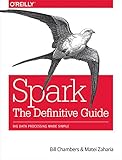Spark : the definintive guide : big data processing made simple
By: Chambers, Bill
Title By: Zaharia, Matei
Material type: BookPublisher: Sebastopol, CA : O'Reilly, c2018.Description: xxvi, 576 p. : ill. ; 24 cm.ISBN: 9781491912218 Subject(s): Machine learningDDC classification: 006.31 CH SP Online resources: Location Map
BookPublisher: Sebastopol, CA : O'Reilly, c2018.Description: xxvi, 576 p. : ill. ; 24 cm.ISBN: 9781491912218 Subject(s): Machine learningDDC classification: 006.31 CH SP Online resources: Location Map | Item type | Home library | Call number | Status | Notes | Date due | Barcode | Item holds |
|---|---|---|---|---|---|---|---|
| REGULAR | University of Wollongong in Dubai Main Collection | 006.31 CH SP (Browse shelf) | Available | Mar2020 | T0064377 |
Includes index.
Part 1. Gentle overview of big data and Spark. What is Apache Spark?
A gentle introduction to Spark
A tour of Spark's toolset
Part 2. Structured APIs : DataFrames, SQL, and datasets. Structured API overview
Basic structured operations
Working with different types of data
Aggregations
Joins
Data sources
Spark SQL
Datasets
Part 3. Low-level APIs. Resilient distributed datasets (RDDs)
Advanced RDDs
Distributed shared variables
Part 4. Production applications. How Spark runs on a cluster
Developing Spark applications
Deploying Spark
Monitoring and debugging
Performance tuning
Part 5. Streaming. Stream processing fundamentals
Structured streaming basics
Event-time and stateful processing
Structured streaming in production
Part 6. Advanced analytics and machine learning. Advanced analytics and machine learning overview
Preprocessing and feature engineering
Classification
Regression
Recommendation
Unsupervised learning
Graph analytics
Deep learning
Part 7. Ecosystem. Language specifics : Python (PySpark) and R (SparkR and sparklyr)
Ecosystem and community.
Learn how to use, deploy, and maintain Apache Spark with this comprehensive guide, written by the creators of the open-source cluster-computing framework. With an emphasis on improvements and new features in Spark 2.0, authors Bill Chambers and Matei Zaharia break down Spark topics into distinct sections, each with unique goals. You'll explore the basic operations and common functions of Spark's structured APIs, as well as Structured Streaming, a new high-level API for building end-to-end streaming applications. Developers and system administrators will learn the fundamentals of monitoring, tuning, and debugging Spark, and explore machine learning techniques and scenarios for employing MLlib, Spark's scalable machine-learning library. Get a gentle overview of big data and Spark Learn about DataFrames, SQL, and Datasets-Spark's core APIs-through worked examples Dive into Spark's low-level APIs, RDDs, and execution of SQL and DataFrames Understand how Spark runs on a cluster Debug, monitor, and tune Spark clusters and applications Learn the power of Structured Streaming, Spark's stream-processing engine Learn how you can apply MLlib to a variety of problems, including classification or recommendation.
